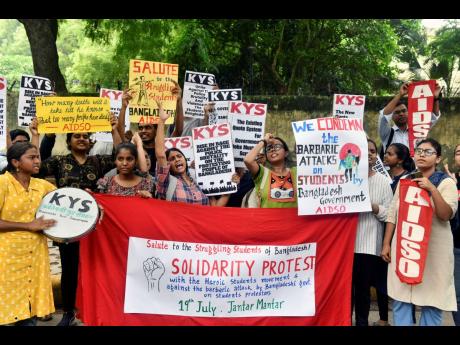Protests over gov’t jobs escalate
DHAKA (AP):
Police and security officials in Bangladesh fired bullets and tear gas at protesters and banned all gatherings in the capital on Friday, as Internet and mobile services were cut off after days of deadly clashes over the allocation of government jobs.
The protests, which began weeks ago but escalated sharply on Monday, represent the biggest challenge to Prime Minister Sheikh Hasina since she won a fourth consecutive term in office after elections in January. Main opposition groups boycotted those polls.
Somoy TR, a local television channel, reported that four more people died in the latest clashes.
This comes a day after the bloodiest day of demonstrations to date when 22 people were killed, according to local media, as protesting students attempted to impose a “complete shutdown” on the country.
The authorities could not be reached immediately to confirm figures for the deaths.
The chaos has highlighted cracks in Bangladesh’s governance and economy and the frustration of young graduates who face a lack of good jobs.
The government has deployed police and paramilitary forces across the capital to lock down campuses and break up protests. On Wednesday, universities including the country’s largest, suspended classes and closed dormitories, and on Friday, Dhaka police said they were banning all gatherings and demonstrations in the capital.
An Associated Press (AP) reporter saw border guard officials fire at a crowd of more than 1,000 protesters who had gathered outside the head office of state-run Bangladesh Television, which was attacked and set on fire by protesters the previous day.
The border guards shot at the crowd with rifles and sound grenades, while police officers fired tear gas and rubber bullets. Bullets littered the streets, which were also marked by smears of blood.
A news producer and reporter at Bangladesh Television on Thursday told the AP that protesters had broken through the main gate and set fire to vehicles and the reception area. They spoke on condition of anonymity, for fear of reprisals.
“I escaped by leaping over the wall but some of my colleagues got stuck inside. The attackers entered the building and set furniture on fire,” the producer said by phone.
Internet services and mobile data were widely disrupted on Thursday night and remained down on Friday in the capital, Dhaka. Social media platforms like Facebook and WhatsApp were also not loading. It coincided with a widespread Internet outage on Friday that disrupted flights, banks, media outlets and companies around the world, but the disruptions in Bangladesh were substantially greater than seen elsewhere.
Student protesters said they will extend their calls to impose a shutdown on Friday as well, and urged mosques across the country to hold funeral prayers for those who have been killed. Major universities have said they will close their doors until tensions ease.
The protesters are demanding an end to a quota system that reserves up to 30 per cent of government jobs for relatives of veterans who fought in Bangladesh’s war of independence in 1971 against Pakistan.
They argue the system is discriminatory and benefits supporters of Prime Minister Sheikh Hasina, whose Awami League party led the independence movement, and they want it replaced with a merit-based system.
But Hasina has defended the quota system, saying that veterans deserve the highest respect for their contributions to the war, regardless of their political affiliation.
The Bangladeshi leader is credited for bringing stable growth to Bangladesh, but rising inflation – thanks in part to the global upheaval sparked by the war in Ukraine – has triggered labour unrest and dissatisfaction with the government.
Even though job opportunities have grown in some parts of the private sector, many people prefer government jobs because they are seen as more stable and lucrative. But there aren’t enough to go around – each year, some 400,000 graduates compete for around 3,000 jobs in the civil service exam.

